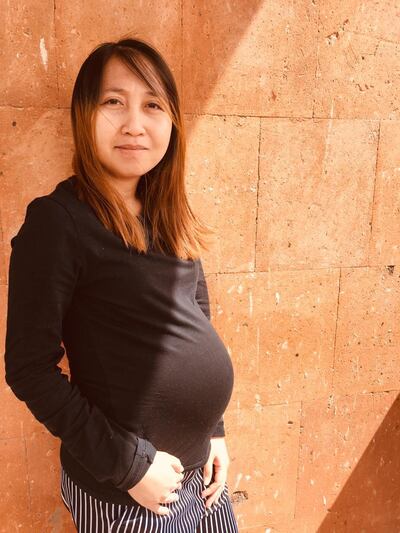Across the world, international air travel has been brought to a near standstill by the Covid-19 pandemic.
Commercial routes into the UAE have been suspended since March 19.
More than 29,000 residents overseas have signed up to a government registration service, Twajudi, for those who want to return to the UAE.
Here, The National tells the stories of a few of those residents who are currently unable to return to the country.
Expectant mum flew to Saudi long before lockdown
Indian national Nadhiya Khalil, 27, flew to Saudi Arabia in early March to see her mother.
She is now in her 32nd week of pregnancy and is concerned that she will run out of time to travel back to the UAE to give birth.
As per Emirates and Etihad travel policy, passengers are not allowed to fly once they reach the 37th week of a single pregnancy.
“She has only weeks left before airlines impose medical travel restrictions on her,” Mustafa Sayed, 26, her husband said.
“We have been dreaming of welcoming our first baby into the world together for so long.”
"I know the UAE is doing everything it can to keep people safe and reduce coronavirus cases, but my wife needs to get home to give birth,” Mr Sayed, an engineer in Dubai, said.
Mother went to Pakistan for operation insurance didn't cover
The National has spoken to several parents who have been separated from their young children due to the pandemic.
Among them is Dubai resident Sobia Imran, who had never spent a night apart from her children until she flew to Pakistan for an operation that her UAE medical insurance did not fully cover in early March.
“It’s just been horrible being separated from them for so long,” she said of her children, son Adeem, 14, and daughter Sarim, 12.
Ms Imran, 42, said flights from Pakistan to Dubai were suspended two days before she was due to return.
She is worried she will lose her job if she stays away any longer.
“I need to get back home to Dubai.”
She is unsure how much longer she will be able to cope without her family.
“I’ve only been able to speak to them over the phone since I’ve been stranded here,” she said. “It has been so upsetting and I’ve been crying every day. I miss them so much.”
Pregnant airline worker went to see family three weeks before flights halted
Vane V, an airline worker, travelled to Mauritius to see her family on March 6 and is now 31 weeks pregnant.
When travel restrictions started to become more widespread, she said she tried to book a flight back to Dubai but passenger planes arriving into Mauritius were also suspended on March 19.
"The birth of our first baby should be a special moment for both my husband and I,” Ms Vane.
“We're desperate to get back to the UAE because everything has been planned carefully for the delivery of our baby in Dubai.
“My doctor is there, my hospital bed is booked and everything we bought for the baby’s arrival is at our home in Dubai.
“I'll be 40 in October, so having my first child it is important that everything goes well and smoothly,” she said.
Couple regret last minute holiday to Armenia
Allaina Pelayo, another expectant mother, and her husband, Eudinson Uy, both from the Philippines, say they have been stuck in Armenia for more than a month.
They now find themselves running out of cash and around 2,000km from home.
“We flew to Yerevan in Armenia on March 14 for a holiday and we were due to return on March 22,” Mr Uy, 33, said.

As the UAE flight ban was announced, we tried to rebook our return trip as soon as possible but were not able to.
“My wife needs to see her doctor in Dubai as she is due to have a scan to check the health of our first baby.
“We had to transfer to a hostel and we are sharing food and expenses with other stranded Filipinos.
“We are spending about Dh70 per day including our hostel stay, and just have about Dh1,000 left in our pockets.”




